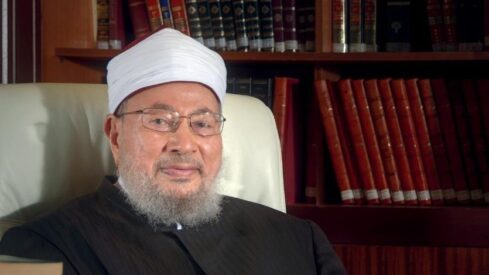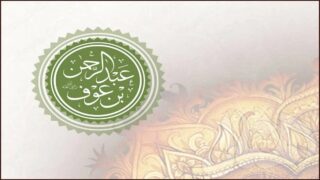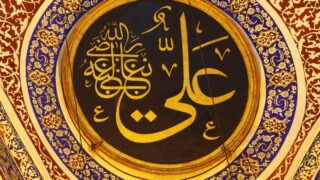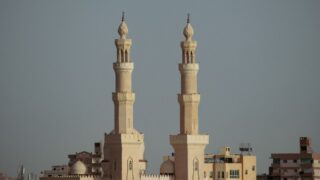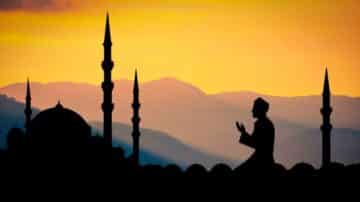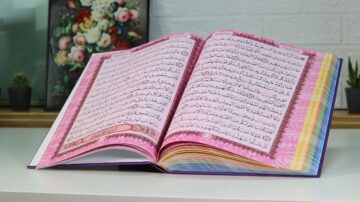Yusuf Al-Qaradawi is one of the best known and more important contemporary Muslim clerics. He is widely read and heeded throughout the Muslim world. This article discusses al-Qaradawi’s thought, his influence, his style of leadership and where he stands on the spectrum of Islamist political thought and activity.
Shaykh Yusuf al-Qaradawi is the cofounder and president of the International Association of Muslim Scholars and the European Council for Fatwa and Research. He has his own Arabic-language website and supervises the popular site Islamonline.net (bilingual English/Arabic). He is extraordinarily prolific, and has written over 100 books on Islam and Islamism. Among his peers, the shaykh’s reputation is held in high regard: The illustrious Mustafa al-Zarqa declared that owning a copy of his al- Halal wal-Haram fil-Islam was “the duty ofevery Muslim family.” The renowned Abu al-Ala al-Mawdudi described his Fiqh al-Zaqa as “the book of this century in Islamic jurisprudence.” Yet he owes his global fame to his regular appearances on the religious program al-Shari’a wal-Hayat, broadcast by al-Jazeera.
Al-Qaradawi as a Religious Leader
In Religious Leadership: Personality, History and Sacred Authority, Richard Hutch offers a paradigm for analyzing that phenomenon. He emphasizes the importance of psychological factors and identifies inner life, society, or culture as the locus of the sacred in a religious leader’s personality.
Based on these parameters, he classifies religious leaders into three types: the self-encountering leader, who locates the source of the sacred within him / herself (a typical case being Joan of Arc); the group-containing leader, who sees his authority as derived from followers, such as Martin Luther King, Jr.; and the tradition-managing leader, who derives authority from positions occupied within the institutional life of a religious tradition.
Shaykh al-Qaradawi is a text book example of a tradition-managing leader. Hutch regards the leader’s early biography as being of crucial value to understanding subsequent evolution. The next section of this article presents a summary of al-Qaradawi’s childhood, adolescence, and early adulthood, adapted from his autobiography.
Al-Qaradawi’s Biography
Yusuf Mustafa al-Qaradawi was born in1926 in Sift Turab, a small village on the Nile Delta whose only remarkable feature is that itis the resting place of one of Muhammad’s minor Companions.
Al-Qaradawi’s father died when he was only two, and he was brought up by his mother in the household of his uncle Ahmad, a poor tenant farmer who considered him a son.
Al-Qaradawi was not deprived of affection during his childhood, and in his memoirs he writes that whereas most people only have one home, he had two: his uncle’s and his maternal grandfather’s, a relatively well-off fruit and cereal merchant who could afford meat twice a week.
Yusuf’s was a traditional, religious family: His uncle Ahmad went to pray in the mosque five times a day, “even for the dawn prayer,” and another of his uncles had memorized the Koran.
He started attending the kuttab (Koranic school) even before he began state school, and in both he was a diligent, hard-working student. He finished memorizing the Koran when he was only nine, thereby earning the title shaykh and the first of a longlist of prizes: a modest amount of money.
Upon completing primary school, Yusuf yearned to continue his education at al-Azhar’s secondary school. Yet because the long years of study there would not guarantee gainful employment, his uncle tried to convince him to learn a trade or open a shop. It was the intervention of a shaykh from a neighboring village–an event al-Qaradawi describes as providential–that persuaded Ahmad to “leave the future in the hands of Him who controls it” and allow his nephew to follow the path he had chosen.
The adolescent moved to Tanta to study at the town’s Azhari secondary school. He was often at the top of the class, which brought him small monetary awards to supplement his income.
While in Tanta, he had the opportunity to listen to Hasan al-Banna, founder and first leader of the Muslim Brothers, and became one of his followers.
He also started writing verse, much of which peppers his memoirs. His first work, published at his own expense, was a theatrical piece inverse about his namesake, Joseph.
At 14, al-Qaradawi already officiated as imam at his village’s mosque on occasions such as Ramadan. His contact with the Muslim Brothers encouraged him to preach in other villages on the Nile Delta “to guide [the people] toward reaffirming [their] faith, rectifying [false] religious concepts, and developing the values and behaviors demanded by religion.”
When he was only20, he started giving lessons in Islamic jurisprudence (fiqh) in his village. According to the shaykh, these lessons were characterized by the three features that would mark his future life as a preacher and scholar: relevance, leniency, and independence from any Islamic legal school.
The villagers of Sift Turab followed the strict Shafi’i school, and the ideas introduced by Yusuf were well received despite criticism from the older shaykhs. In particular, his teaching that touching a woman does not invalidate the ablutions–a common source of dispute that arose when a wife accidentally touched her husband while serving him dinner, forcing him to perform ablutions again before the evening prayer–proved popular with the women who, when their husbands got angry, would exhort them: “Calm down! Pray according to Shaykh Yusuf’s school.”
In his autobiography, al-Qaradawi devotes much attention to three major issues in the political life of Egypt during the first half of the twentieth century: the opposition to British colonialism, Zionist ambitions in Palestine, and the rivalry between the Wafd party and the Muslim Brothers.
He often draws attention to his own role: While at the Azhari secondary school, he was elected student leader, and his was an exceptional leadership in that it was “both loved by the students and respected by the shaykhs,” and was able “to promote the national, Arab, and Islamic causes… without getting involved in the customary acts of violence.”
He worked briefly at the Ministry of Religious Endowments and at the cultural department of al-Azhar, and in 1962 this institution sent him to Qatar to run its center there. In Doha, he established the Department of Islamic Studies and the Faculty of Islamic Law and Islamic Studies at the Teacher Training College. In 1973 he earned his doctorate from al-Azhar, with a thesis on “The Role of Legal Alms [Zakat] in the Resolution of the Social Problems.” Since then, he has written numerous books.
Awards and Recognitions
Al-Qaradawi has been awarded by various countries and institutions for his numerous contributions to Islamic society. Among them are
• The Islamic Development Bank (IDB) Prize in Islamic Economics – 1991
• King Faisal International Prize for Islamic Studies – 1994
• Sultan Hassanal Bolkiah (Sultan of Brunei) Award for Islamic Jurisprudence – 1997
• Sultan Al Owais Award for Cultural & Scientific Achievements – 1998–1999
• Dubai International Holy Quran Award for Islamic Personality of the Year – 2000
• The State Acknowledgement Award for contributions in the field of Islamic Studies from the Government of Qatar – 2008.
The Qatar Faculty of Islamic Studies, part of the Qatar Foundation for Education, Science and Community Development, instituted the “Sheikh Yusuf Al Qaradawi Scholarships” in 2009, awarding them to five students each year for post-graduate studies. It also named after him its established research centre, The Qaradawi Center for Islamic Moderation and Renewal.
The State Merit Prize for Islamic Studies was issued to Qaradawi by the Ministry of Culture, Arts and Heritage of Qatar on 3 November 2009
He is a trustee of the Oxford Centre for Islamic Studies and has been named as the technical consultant for a multimillion-dollar English-language film about Mohammed, produced by Barrie Osborne.
A 2008 Foreign Policy online poll put him at No.3 in the list of the Top 20 Public Intellectuals worldwide.
Books and Academic Works
Al-Qaradawi has authored more than 120 books and his academic style and objective thought are considered to be some of the main characteristics of his works. Some of which were translated into English.
- Fiqh al-Zakat, His book Fiqh al-Zakat is considered by some as the most comprehensive work in the area of zakat.
- Fiqh al-Jihad, His book Fiqh al-Jihad has been widely commented on.
- Islam: Modern Fatwas on Issues of Women and the Family (Fatawa Mu’asira fi Shu’un al-Mar’a wa al-Usrah) (Dar al-Shihab, Algeria, 1987)
- Auspices of the Ultimate Victory of Islam, Doha (1996)
- Towards a Sound Awakening
- The lawful and the prohibited in Islam=al-Halal wal-haram fil Islam. Indianapolis, IN, USA: American Trust Publications. 1999. ISBN 978-0-89259-016-2.
- The desired Muslim generation. Riyadh: International Islamic Publishing House. 1999. ISBN 978-9960-85 24-5.
Ana Belén Soage: Shaykh Yusuf Al-Qaradawi: Portrait of a Leading Islamic Cleric, Middle East Review of International Affairs, Vol. 12, No. 1 (March 2008) 51.
https://www.al-qaradawi.net/

